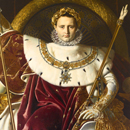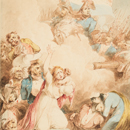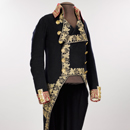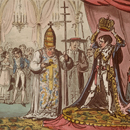The rise of Napoleon Bonaparte
Some saw in Napoleon only the great general ; some saw the ground of his elevation in his political talents ; while others regarded him merely as an adventurer favoured by fortune: all forgot that for the explanation of the astonishing success of this man, it was indispensable to connect his personal qualities with the circumstances in which he lived.
Klemens Wenzel von Metternich (1773-1859), Memoirs of Prince Metternich
In 1793, Napoleon Bonaparte commanded the artillery at the siege of Toulon. Eleven years later, at the age of thirty-four, he became Emperor of the French.
This meteoric rise resulted from the conjunction of two principal factors. First the war, which since 1792 had opposed revolutionary France against the principal European powers and provided this young officer with exceptional conditions for advancement. Next, the political instability characteristic of the revolutionary period gave him the means with which to realize his ambitions.
Victorious and charismatic, Bonaparte obtained the support of influential men such as Carnot and Barras before imposing himself on France as a leading political personality.
In Italy, Germany and Great Britain, the newspapers followed the exploits of the main actors in the Revolution and participated in the emergence of a new hero. The first biographies of the young general appeared in London in 1797, presenting him as a defender of peace and liberty.
However, the Egyptian expedition, the coup d'état of 18 Brumaire and, above all, the proclamation of the Empire in 1804 tempered this enthusiasm, illustrated by Beethoven's decision not to dedicate his Eroica to Napoleon as he had intended.

   
|

|
Watch the animation of the historic re-enactment of the soldier’s kit in the army of Napoleon (length : 3 minutes 49seconds, french voiceover) |
Watch "Commentary of masterpiece : Bonaparte franchissant le col du Grand Saint-Bernard" (length : 2 minutes 23 seconds, french commentary) |

The victorious general
On the 15th of May, 1796, General Bonaparte made his entry into Milan at the head of that young army which had shortly before crossed the Bridge of Lodi and taught the world that after all these centuries Cæsar and Alexander had a successor.
The Charterhouse of Parma, Stendhal

Rise to power
The universal error in Europe arose from the fact that the vast encroachments made by the violent ambition of one man were supposed to spring from a national movement in France itself.
Memoirs of Prince Metternich

A man of peace
Buonaparte, by uniting the warrior and the statesman in his own person, has consummated the glory of his adopted country.
Biographical memoirs of the French Revolution, John Leycester Adolphus

The sovereign
I have always been of opinion, that the sovereignty lay in the people. In fact, the imperial government was a kind of republic. Called to the head of it by the voice of the nation, my maxim was “the career open to talents, without distinction of birth or fortune”. […] “My Government, as it was with a coalition that threatened me constantly, should it be in a conspicuous manner or wrapped in the shadows of mystery, proved to be the most liberal in Europe at the time.
Napoleon in exile or A voice from St. Helena. The opinions and reflections of Napoleon on the most important events of his life and government in his own words, Barry Edward O’Meara













